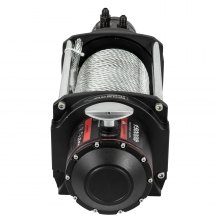VEVOR Gives Tips For Maintaining and Troubleshooting Hydraulic Winch Systems
Hydraulic winch systems play a vital role in various industries, making heavy lifting and hauling easier and more efficient. Whether in construction sites, marine, or infrastructure, these systems are essential to their success. However, like any machine, a hydraulic winch requires proper maintenance and periodic troubleshooting for proper operation and longevity.
Maintenance of hydraulic winch systems is of the utmost importance to ensure their continued operation and long-term reliability. VEVOR emphasizes the importance of regular and thorough monitoring to identify potential issues before they become major problems. In addition to proactive maintenance, VEVOR provides comprehensive insight into solving common problems with hydraulic winch systems
Benefits Of Hydraulic Winches
Hydraulic winches offer numerous benefits across a wide range of applications. These benefits make them indispensable in industries where precise and high-volume power application is necessary, including marine, manufacturing, and material handling.
High Power and Torque
Hydraulic winches can deliver high levels of power and torque, making them ideal for heavy-duty applications such as lifting heavy loads, towing, and towing. The hydraulic system provides consistent and reliable power, allowing the winch to handle complex objects easily.
Smooth and Controlled Operation
Hydraulic winches provide efficient operation and maintenance thanks to the hydraulic fluid’s ability to transfer energy efficiently.
Operators have precise control over the speed and direction of the winch, allowing loads to be precisely positioned and operated accurately without sudden or accidental jolts.
Safety
Hydraulic winches are designed with safety in mind and equipped with devices to prevent accidents and equipment damage, such as pressure-relieving valves, load-soaring brakes, etc.
Operators and inspectors are at lesser risk of accidents because of the incorporated safety features.
Low Maintenance
Hydraulic winches generally require less maintenance than other types due to their robust construction
Routine maintenance tasks such as fluid testing and filter changes are extremely simple, reducing downtime and operating costs.
Different Types Of Hydraulic Winch
Hydraulic winches come in various types, each tailored to specific applications and operational requirements.
Here are some types of hydraulic winches, their features, and what they can be used for:
Compact Hydraulic Winch
Compact hydraulic winches are designed for applications where space is limited or limited by weight. These winches have a lightweight and flexible design, making them suitable for light vehicles, trailers, or equipment that require size and weight consideration.
Despite their compact size, they provide strong and reliable performance.
Industrial hydraulic winches are heavy-duty winches designed for industrial applications such as construction, mining, and marine operations.
These winches are characterized by their rugged housing, high tensile capacity, planetary gear system, active braking, over-impact protection, and other advanced features capable of handling large loads, as they work regularly in harsh environments.
Traction Hydraulic Winch
Traction hydraulic winches are specialized for applications requiring precise control and traction, such as cable pulling and tensioning.
These winches are commonly used in construction, telecommunications, and utility-maintenance work where tension and maintaining consistent alignment are critical.
How To Troubleshoot Common Hydraulic Winch Problems
Troubleshooting common hydraulic winch problems is essential for maintaining operational efficiency and minimizing downtime. Here are ways to troubleshoot some of the most common hydraulic winch problems.
Loss of Power or Slow Operation
To solve this problem, ensure the hydraulic fluid reservoir is properly filled to the recommended level. Also, look for signs of leaks, such as fluids or drips, and tighten or replace damage.
If it persists, the hydraulic system can be bled to remove trapped air and improve flow. Finally, check the pump for wear and tear and replace it if necessary.
Unresponsive or Sticking Controls
Inspect the control valve for obstructions or debris that could cause sticking or malfunction. Thoroughly clean valves and lubricate leaking parts for proper operation.
Replace any worn or damaged components and ensure control cables are properly routed and tightened. Lastly, drain the tubes and replace them if they look dirty or contaminated.
Overheating
Low water or distilled water can cause overheating. Ensure the hydraulic fluid reservoir is adequately filled with high-quality, clean water.
Also, straighten or replace any kinked hoses and tighten loose fittings to improve drainage. Also, the winch periodically cools down during prolonged use to prevent overheating.
Why Choose VEVOR?
VEVOR hydraulic winch systems offer unmatched quality, reliability, innovation, customization processes, and exceptional customer service. With competitive pricing, global recognition, and a proven track record in industrial applications, commercial projects are a foremost choice among hydraulic winch makers. Whether you need a hydraulic winch for commercial or personal uses, VEVOR provides solutions to meet your needs best
With years of experience and a proven track record in the industry, VEVOR has earned the trust and confidence of customers around the world. Our reputation for efficiency and reliability makes us the preferred choice for hydraulic winch systems among professionals and enthusiasts.
In addition, VEVOR has a global presence, enabling customers worldwide to access our products and services. Whether you are a local or international buyer, you can rely on VEVOR’s extensive distribution network to provide quality hydraulic winch systems wherever you are.
FAQs About Hydraulic Winch
What are the typical applications of hydraulic winches?
Hydraulic winches are used in various industries and applications, such as construction, mining, forestry, marine, off-road vehicles, and utilities. They are commonly used in lifting heavy machinery, towing vehicles, hauling logs, loading vessels, and recovering vehicles.
What are the advantages of hydraulic winches over electric winches?
Hydraulic winches offer many advantages over electric winches, such as higher pulling power, more efficiency, and greater durability. They are suitable for continuous use and are also unaffected by environmental factors such as temperature and humidity, making them ideal for outdoor .
How do I choose the right hydraulic winch for my application?
When selecting a hydraulic winch, consider factors such as required pulling power, cable speed, mounting methods, control methods, and environmental conditions. It is necessary to winch information and the specific requirements of your application to ensure proper and secure performance.










































